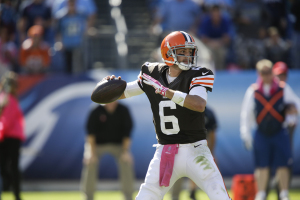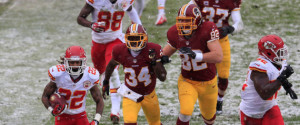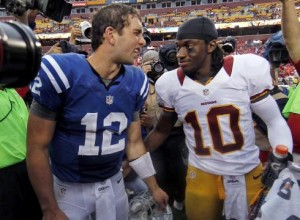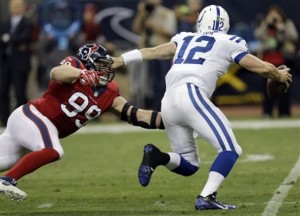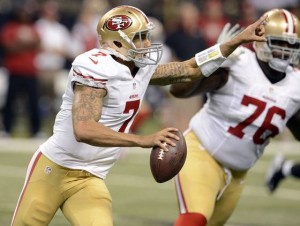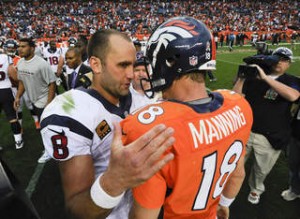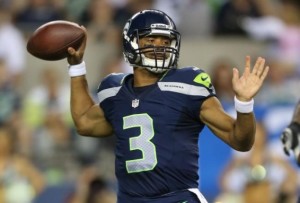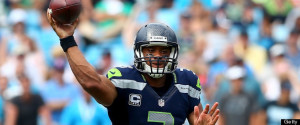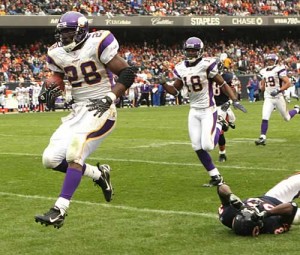Week 16 saw some very large Game Scripts in some very important games. The Eagles-Bears showdown turned into a laugher, as Philadelphia posted the 3rd best Game Script of the season. The New England/Baltimore rivalry is famous for producing close games, but the Patriots embarrassed the Ravens on their home field. New England scored a couple of late defensive touchdowns to boost the final margin of victory, but the team still held an average lead of 15.2 points. Against Minnesota, Andy Dalton channeled his inner Ken Anderson — which seems to happy every few weeks — and helped the Bengals annihilate the Vikings.
The table below shows the week 16 Game Scripts data. As always, you can view the results from every game this year at this page.
Five teams posted a negative Game Script and called a more run-heavy game plan than their opponent. One of the most surprising instances came in Detroit, where the Lions held an average lead of 1.2 points. Detroit is famous for their pass-happy ways, but while Matthew Stafford threw 42 passes, the Lions passed on only 55% of their plays. The Giants are wont to keep Eli Manning under wraps (for good reason), but actually passed on 68.3% of their plays. There was a reason for New York’s pass-happy approach: with David Wilson and Brandon Jacobs out for the year, once Andre Brown suffered a concussion, even Tom Coughlin was forced to put the game in Manning’s hands. After all, the alternative was handing off to Bear Pascoe.
Less surprising was seeing Peyton Manning and the Broncos pass on three out of every four plays despite holding an average lead of 6.8 points. The Texans won the all unimportant time of possession battle, but Manning threw for 400 yards and 4 touchdowns.
Also not surprising: the run-heavy Jets running on 48% of their plays against the pass-happy Browns. New York just barely lost the Game Script battle, and Cleveland predictably passed on two out of every three plays. The same can be said for run-heavy San Francisco (44.4%) against pass-happy Atlanta (71%), in a game that the Falcons actually led by, on average, 1.1 points.
In Jacksonville, the game was pretty even — Tennessee won the game but posted a Game Script of -1.2. But the Titans running game was rolling — both Chris Johnson and Shonn Greene rushed for 90 yards, leaving Ryan Fitzpatrick to play the role of caretaker. For the Jaguars, the pass-heavy game plan consisted of a lot of short, safe throws. That’s been the norm for Chad Henne, who ranks last on the season in both air yards per pass attempt (6.55) and average air yards on completions (4.76) according to NFLGSIS.
One team not on the list is Dallas, who held an average lead of 1.0 points against Washington…. and actually ran more frequently than one of the most run-heavy teams in the NFL! This was a severe case of overreaction to the pass-happy ways of last week. Dallas has played six games this year where the Game Script was between -1.5 and 1.5 points. In four of those games, Dallas passed on 70% of their plays, including an 86% rate against Minnesota. Having a close to 50/50 split is way out of the norm for Dallas in close games: in addition to the game last week, the only other time where the Cowboys were below 70% came in another run-heavy game plan against Detroit in week 8.
One thing that will be fascinating to watch is how pass-heavy the game plan is with Kyle Orton instead of Tony Romo this week. The Cowboys very pass-heavy on the season, of course, but Dallas also has a tendency for run-heavy games every once in a while (the Lions games, and the Raiders/Bears games right before the Packers meltdown). Without Romo, which way will they go?
Game Scripts Standings
We can also calculate Game Scripts standings for the season. As it turns out, the 49ers have held an average lead of 5.6 points, placing them number one in the Game Script standings. I was pretty shocked to discover that, but San Francisco has outscored opponents by 91 points in the first half of games this year, second to only Kansas City (93). The 49ers also lead the league in scoring margin through three quarters. One reason for that is San Francisco has allowed a league-low 36 points in the third quarter this year, and also leads the NFL in points allowed through three quarters.
The Broncos, on the other hand, have been a bit of a second half team in 2013. It’s not like Denver is bad in the first half, but the Broncos have already set the record (previously held by last year’s team) for points scored in the second halves of games with 315!
After calculating the Game Script scores for each team, I then adjusted the numbers for strength of schedule. The 49ers still come out as number one; here’s how to read the table below. San Francisco has held an average lead of 5.6 points, has faced a schedule that is 0.5 points tougher than average, giving the 49ers a schedule-neutral Game Script of 6.1.
One name that’s surprising at the bottom of that list is Chicago. After all, the Bears have a winning record and can win the NFC North with a win this weekend. But Jay Cutler has led 3 fourth quarter comebacks, and Josh McCown led one more, and those games account for half of the team’s wins. The Eagles game was obviously a disaster, bringing down the team’s rating, but Chicago also posted a -11.2 against St. Louis, a -10 against the Lions, and a -9.2 in a home loss to the Saints. And the Bears have posted a Game Script of +3.0 or better just three times all season.



